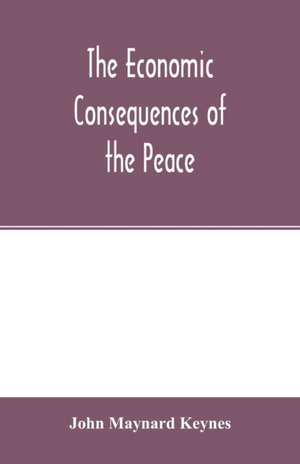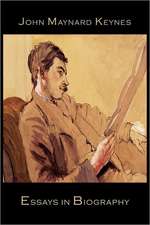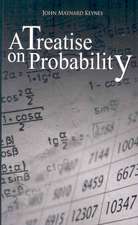The economic consequences of the peace
Autor John Maynard Keynesen Limba Engleză Paperback – 22 apr 2020
Preț: 116.55 lei
Nou
Puncte Express: 175
Preț estimativ în valută:
22.30€ • 24.30$ • 18.79£
22.30€ • 24.30$ • 18.79£
Carte tipărită la comandă
Livrare economică 23 aprilie-07 mai
Preluare comenzi: 021 569.72.76
Specificații
ISBN-13: 9789354015137
ISBN-10: 9354015131
Pagini: 306
Dimensiuni: 140 x 216 x 19 mm
Greutate: 0.43 kg
Editura: Alpha Editions
ISBN-10: 9354015131
Pagini: 306
Dimensiuni: 140 x 216 x 19 mm
Greutate: 0.43 kg
Editura: Alpha Editions
Cuprins
1. Introduction by Michael Cox.- 2. Original Preface from John Maynard Keynes.- 3. Chapter I: Introductory.- 4. Chapter II: Europe Before the War.- 5. Chapter III: The Conference.- 6. Chapter IV: The Treaty.- 7. Chapter V: Reparation.- 8. Chapter VI: Europe After the Treaty.- 9. Chapter VII: Remedies
Notă biografică
John Maynard Keynes (1883-1946) was educated at Eton and at Kings College, Cambridge, where he took his degree in 1905. After a period in the India Office of the Civil Service, he returned to Cambridge as a lecturer in economics. During World War I he held a post at the Treasury and was selected as an economic adviser to the British delegation at the Paris Peace Conference in 1919. He resigned that position in June of that year and wrote and published The Economic Consequences of the Peace, in which he argued against the excessive reparations required of Germany. Between the wars he was a financial adviser and a lecturer at Cambridge. His major and most revolutionary work, The General Theory of Employment, Interest and Money, was published in 1936. Keynes played a central role in British war finance during World War II and, in 1944, was the chief British representative at the Bretton Woods Conference that established the International Monetary Fund. The transformations which Keynes brought about, both in economic theory and policy, were some of the most considerable and influential of the twentieth century, laying, in effect, the foundations for what is now macroeconomics.
Robert Lekachman was a professor of economics at Lehman College, City University of New York, and is the author of The Age of Keynes and Capitalism for Beginners.
Robert Lekachman was a professor of economics at Lehman College, City University of New York, and is the author of The Age of Keynes and Capitalism for Beginners.
Recenzii
“The Economic Consequences of the Peace is almost certainly Keynes’s most accessible book which has been read for pleasure by non-economists as much as by economists themselves. … In many ways The Economic Consequences of the Peace is a stand-out volume in Keynes’s wider oeuvre.” (LSE Review of Books, blogs.lse.ac.uk, November 20, 2019)
Textul de pe ultima copertă
First published in December 1919, this global bestseller attacking those who had made the peace in Paris after the First World War, sparked immediate controversy. It also made John Maynard Keynes famous overnight and soon came to define how people around the world viewed the Versailles Peace Treaty. In Germany the book, which argued against reparations, was greeted with enthusiasm; in France with dismay; and in the US as ammunition that could be (and was) used against Woodrow Wilson in his ultimately unsuccessful bid to sell the League of Nations to an increasingly sceptical American public. Meanwhile in his own country the book provoked outrage amongst establishment critics – Keynes was even refused membership of the prestigious British Academy – while admirers from Winston Churchill to the founders of the LSE, Sidney and Beatrice Webb, went on to praise Keynes for his wisdom and humanity. Keynes may have written what he thought was a reasoned critique of the economics of the peace settlement. In effect, he had penned a political bombshell whose key arguments are still being debated today. The Economic Consequences of the Peace is now reissued by Keynes’ publisher of choice with a new introduction from Michael Cox, one of the major figures in the field of International Relations today. Scholarly yet engaged and readable, Cox’s introduction to the work – written a century after the book first hit the headlines – critically appraises Keynes' polemic contextualising and bringing to life the text for a new generation of scholars and students of IR, IPE, Politics and History. The original text and this authoritative introduction provide essential reading for anyone who wishes to understand the tragedy that was the twentieth century; why making peace with former enemies can be just as hard as winning a war against them; and how and why ideas really do matter.
John Maynard Keynes (1883-1946) has justifiably been called the most influential economist of the twentieth century. His behind the scenes account of what went on Paris in 1919 also marked him out as one of the greatest masters of the polemical form in the English language. A renaissance man who was just as much at home in the world of art and ballet as he was discussing probability theory and the history of economic thought, Keynes left an indelible mark on the world through his work as an economist, journalist, sponsor of the arts, and policy-maker in two wars.
Michael Cox is Director of LSE IDEAS and Professor Emeritus of International Relations at the London School of Economics. Over a long and distinguished career he has published work on the former USSR, the Cold War, US foreign policy and more recently on the reshaping of world order in the 21st century. His work on E.H.Carr and Carr's The Twenty Years' Crisis has only confirmed his reputation as a scholar of international standing. He is currently working on a history of the London School of Economics entitled: The School: The LSE and the Shaping of the Modern World.
John Maynard Keynes (1883-1946) has justifiably been called the most influential economist of the twentieth century. His behind the scenes account of what went on Paris in 1919 also marked him out as one of the greatest masters of the polemical form in the English language. A renaissance man who was just as much at home in the world of art and ballet as he was discussing probability theory and the history of economic thought, Keynes left an indelible mark on the world through his work as an economist, journalist, sponsor of the arts, and policy-maker in two wars.
Michael Cox is Director of LSE IDEAS and Professor Emeritus of International Relations at the London School of Economics. Over a long and distinguished career he has published work on the former USSR, the Cold War, US foreign policy and more recently on the reshaping of world order in the 21st century. His work on E.H.Carr and Carr's The Twenty Years' Crisis has only confirmed his reputation as a scholar of international standing. He is currently working on a history of the London School of Economics entitled: The School: The LSE and the Shaping of the Modern World.
Caracteristici
Provides essential background to Keynes and the historical events which shaped the book’s argument and reception Offers a much needed up-to-date account of Keynes' impact on the evolution of international relations, international political economy and contemporary politics Assesses the history of the book over a century and the ongoing debate amongst historians and economists about its accuracy, impact and influence Make this important work accessible to a new generation of students of IR, IPE and Politics
Descriere
Descriere de la o altă ediție sau format:
John Maynard Keynes, then a rising young economist, participated in the Paris Peace Conference in 1919 as chief representative of the British Treasury and advisor to Prime Minister David Lloyd George
John Maynard Keynes, then a rising young economist, participated in the Paris Peace Conference in 1919 as chief representative of the British Treasury and advisor to Prime Minister David Lloyd George





